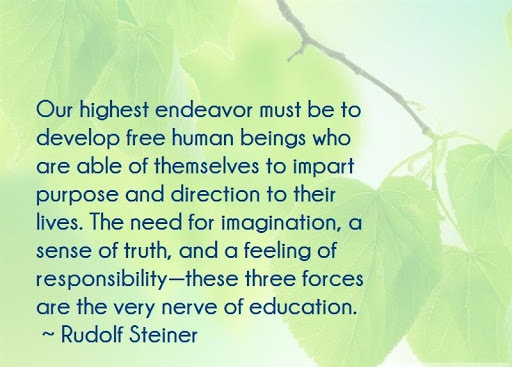Why Waldorf?
Waldorf Education: An Introduction
|
Waldorf schools offer a developmentally appropriate, experiential, and academically rigorous approach to education. They integrate the arts in all academic disciplines for children from preschool through twelfth grade to enhance and enrich learning. Waldorf education aims to inspire life-long learning in all students and to enable them to fully develop their unique capacities.
Founded in the early 20th century, Waldorf education is based on the insights, teachings and principles of education outlined by the world-renowned artist, and scientist, Rudolf Steiner. The principles of Waldorf education evolve from an understanding of human development that addresses the needs of the growing child. |
Music, dance and theater, writing, literature, legends and myths are not simply subjects to be read about and tested. They are experienced. Through these experiences, Waldorf students cultivate their intellectual, emotional, physical and spiritual capacities to be individuals certain of their paths and to be of service to the world.
Professors who have taught Waldorf students across many academic disciplines and across a wide range of campuses—from State Universities to Ivy League—note that Waldorf graduates have the ability to integrate thinking; to assimilate information as opposed to memorizing isolated facts; to be flexible, creative and willing to take intellectual risks; and are leaders with high ethical and moral standards who take initiative and are passionate to reach their goals. Waldorf graduates are highly sought after in higher education.
Teachers in Waldorf schools are dedicated to generating an inner enthusiasm for learning within every child. This eliminates the need for competitive testing, academic placement, and rewards to motivate learning and allows motivation to arise from within. It helps engender the capacity for joyful life-long learning.
Waldorf education is independent and inclusive. It upholds the principles of freedom in education and engages independent administration locally, continentally and internationally. It is a regionally appropriate education with hundreds of schools worldwide today. Waldorf education is truly Inspired Learning.
Reposted from AWSNA
Professors who have taught Waldorf students across many academic disciplines and across a wide range of campuses—from State Universities to Ivy League—note that Waldorf graduates have the ability to integrate thinking; to assimilate information as opposed to memorizing isolated facts; to be flexible, creative and willing to take intellectual risks; and are leaders with high ethical and moral standards who take initiative and are passionate to reach their goals. Waldorf graduates are highly sought after in higher education.
Teachers in Waldorf schools are dedicated to generating an inner enthusiasm for learning within every child. This eliminates the need for competitive testing, academic placement, and rewards to motivate learning and allows motivation to arise from within. It helps engender the capacity for joyful life-long learning.
Waldorf education is independent and inclusive. It upholds the principles of freedom in education and engages independent administration locally, continentally and internationally. It is a regionally appropriate education with hundreds of schools worldwide today. Waldorf education is truly Inspired Learning.
Reposted from AWSNA
Preparing for Life
Preparing for Life, is a new documentary film about the Waldorf School of the Peninsula, produced by Potential SF. For children to lead successful lives in any sector of our society, whether that's in technology, the arts, education or the public sector, they will need the capacities for creativity, resiliency and innovative thinking, all diverse skills that transcend disciplines and foster high levels of social and emotional intelligence. Preparing for Life, captures the essence of how Waldorf School of the Peninsula prepares students to be '21st century smart'. It takes a comprehensive look at Waldorf School of Peninsula though scenes from the classroom; parent, teacher, and alumni interviews; student work and performances; and sports, festivals and community events.
Read more about the Association of Waldorf Schools of North America in their most recent newsletter here.
Waldorf Education celebrated its 100 Year Anniversary in 2019!
We hope that you enjoy these films created for this Anniversary.
|
|
|
There are a number of films that describe the essence of Waldorf Education. We hope that you take some time to view them and contact us for further information.
Educating Children for the Journey: Jack Petrash
Our world is changing at a rapid and dramatic pace. Every decade brings technological advances and unforeseen social change. So how can we prepare our children for a world we can’t envision? The best way to do that is to educate our children to develop three essential capacities: a capacity for vibrant and vigorous activity, a capacity for a sensitive and yet resilient emotional life, and a capacity for clear, focused, original, thinking.


